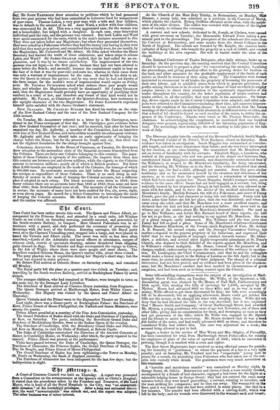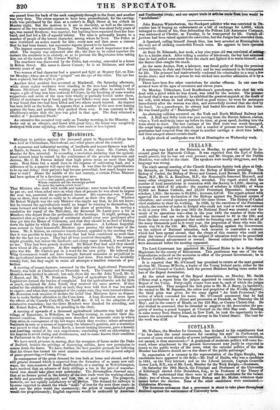ebe ItIttrop 3 S.
A Court of Common Council was held on Thursday. A report was presented froma Committee on the arrangements at the Queen's visit to Christ's Hospital: it stated that the precedence taken by the President and Treasurer, of the Lord Mayor, who is head of all the Royal Hospitals in the City, was "an unwarrant- ahlthinvation" nf. his Lordship's privileges. After a.long and animated discus- sion,-the word 'unwarrantable " was struck nut, and the report was adopted. The other business was of minor interest. At the Church of the Most Holy Trinity, in Bermondsey, on Monday, 'WM Zimmer, a young lady, was admitted as a noviciate in the Convent of Mercy, which adjoins the church. Bishop Griffiths officiated at the altar, with the assist- ance of ten other divines. The edifice was crowded with spectators of the higher class of society, to witness the ceremony.
A convent and new schools, dedicated to St. Joseph, at Chelsea, were opened with great ceremony on Tuesday; the Honourable Edward Petre taking a pro- minent part in the proceedings. The preceptors of the schools are five nuns from the Convent at Bermondsey, and some monks from the Jesuit Colleges in the North of England. The schools are founded by Mr. Knight, the eminent horti- culturist of King's Road; who bought the property at a cost of 5,0001., and erected the buildings at his own expense. His wile is buried under the altar of the chapel.
The National Conference of Trades Delegates, after daily sittings, broke up on Saturday. On the previous day, the meeting resolved that the Central Commathre should be instructed to prepare a plan " for concentrating the energies, legalizing
the ' s, and giving practical effect to the growing desire for location on the nd, and other measures for the profitable employment of the funds of such unions as should be desirous of thus using them." The Committee were further instructed to recommend to all trades the propriety of becoming the possessors of their own labour, and to establish stores from which to procure provisions, the profits arising therefrom to be devoted to the purchase of land on which to employ surplus labour; to direct their attention to the systematic organization of the trades throughout the country, for the better regulation of trades matters and trades strikes, in all the societies that may unite in the association. On Satur- day, divers reports made by the Central Committee were adopted; and other sub- jects were referred to the Committee—including short time, and sanatory improve- ments in the condition of the working-classes. It was resolved, that the future meetings of the Conference should be held alternately at different towns or cities, and that a fund of Id. should be levied on each member of the union, to defray the ex- penses of the Conference. Thanks were voted to Mr. Thomas Duncombe, the chairman. In acknowledging the compliment, he mentioned that one hundred delegates were preSent, representing 100,000 a the labouring population of Eng- land. The assemblage then broke up; the next meeting to take place in the last week of July.
The Diocesan inquiry into the conduct of the Reverend Frederick Smith Maack- ton, Perpetual Curate of St. Peter's, West Hackney, closed on Saturday. More evidence was taken in exculpation. Sarah Huggins was reexamined at consider- able length, and with more minuteness than before; and she was twice interrupted by her emotion, at one time fainting. She maintained that Mr. Monckton was not on terms of familiarity with his servants. Elizabeth Biggs, a laundress, who worked at the parsonage, who and was present at the dinner on Christmas Day, corroborated Sarah Huggins's statements, and diametrically contradicted that of the Williams's, in respect to Mr. Moncktou's familiarity, his being intoxicated, and his throwing Mr. Williams on to the floor. This witness admitted that about five years ago she had a child, although not married. Anne Day gave similar testimony; and so far exonerated herself by the clearness and directness of her answers, as to extort from the opposite counsel a retractation of insinuations which had been made against her. Susan Huggins, Sarah's younger sister, gave evidence to the same effect: Susan had not been engaged as a servant, but, being unkindly treated by her stepmother though in bad health, she was allowed to re- main with her sister, and to have the advice of the medical attendant on Mr. lilonektou's family. Matilda Barnard, the wife of a Policeman, and sister of Fanny Froude, gave the girl a bad character as being idle and dilatory. Fanny told her sister, some time before she left her place, that she was dismissed; and when she came away she cried, said that Mr. Monckton was a most excellent master, aed declared that she had not had so good &situation before. She never told to the witness any of the stories about Mr. Monckton'a immoral bonduct. She used to go to Mrs. Williams; and, before Mrs. Barnard heard of these reports, she told her not to go there, as she had nothing to say ainst Mr. Monckton. She was of a pliant temper, easily influenced. Mrs. WilliamsIsaid she was sorry that Fanny had left so good a place. Some of Mr. Monckton's relatives—Lieutenant Horace Manners Monckton, of the Twenty-ninth Regiment of Foot, Mr. Arthur A. B. Bennett, his second cousin, and the Dowager Viscountess Galway, his mother—deposed to the general propriety of his behaviour, and expressed their belief that he was incapable of improper conduct towards women. Mr. Older- thaw, a solicitor, and several other highly-respectable attendants at St. Peter's Church, also deposed to their disbelief of the reports against Mr. Monckton, and to Williams's evident malignity. Mr. Doane, counsel for the promoter of the charges, replied; endeavouring to expose the weakness of the evidence in exculpa- tion. fir. Lushington, the Chief Commissioner, said that he and his colleagues would make a formal report to the Bishop of London on the 8th April; but in the mean time, he stated the substance of their judgment. The charge of a criminal intercourse had not been proved, and no evidence had been given of the drunken.. ness; but Mr. Moncktou's conduct had been marked by circumstances of great suspicion, and had been such as to bring scandal upon the Church.
Some bill-swindling transactions were the subject of an investigation at Marl- borough Street Police-office, on Tuesday. Mr. Willis, of the Quadrant, a bill- discounting Agent, was charged by Mr. Hearn, of Pall Mall, Parliamentary and Irish agent, with stealing two bills of exchange for 1,1001., accepted by Mr. Mytton. Hearn had advanced 800/. on these bills; and as he was in want of money, Willis offered to get them discounted for him: the bills were accordingly left to be discounted; but on applying afterwards, Hearn could get neither the bills nor the money, so he charged the other with stealing them. Willis did not deny that he had obtained the bills in the way described; but it was explained that "'Messrs. Smith and Company," of Great Marlborough Street, bad swindled. Mr. Mytton, a young gentleman who came of age last November, out of these and other bills; giving him no consideration for them, and decamping as soon as they had got possession of the bills; which Mr. Willis was engaged by Mr. Mytton and his friends to assist in recovering. Mr. Hearn declared that he was a bond fide holder of the notes, and had really advanced 8001. on them; and therefore he considered Willis had robbed him. The case was adjourned for a week; the accused being allowed to put in bail.
Jagger, a butler in the service of Miss Wynn and Mrs. Shipley, of Piccadilly, has been committed for trial, from Marlborough Street Police-office, for robbing his employers of plate of the value of upwards of 5001.; which he succeeded in pawning, though it is marked with a crest and cipher.
The Bow Street Magistrates have resolved on using effectual means for punish- ing the brutality of " gentlemen " to whom the payment of a fine is a very light penalty; and on Saturday, Mr. Twyford sent two " respectable " young men to prison for a month, for assaulting some Policemen who had taken one of the cul- prits into custody while drunk. The gentlemen were very much astonished at this treatment.
A "horrible and mysterious murder" was committed on Monday n t, in George Street, St. Giles's. Between ten and eleven o'clock, a man meanly accompanied by a female of bad character, engaged a bed-mom for the night at s miserable lodging-house in George Street: they had not entered the room many minutes before they were heard quarrelling ; a servant, entering to interfere, saw the man stilling his companion; and he then ran away. The woman fell on the floor, and it was found that she had been stabbed in many places. She died in I few minutes. The murder had been effected with a carving-knife, which was left in the body; and six wounds were discovered in the WOMAITS neck and breast; one passed from the back of the neck completely through to the front, and another was very deep. The crime appears to have been premeditated; for the carving- knife was purchased by the man at a cutler's in High Street at ten o'clock on Monday night But the motives to it are in obscurity, as well as the circum- stances of the two miserable creatures. The woman, who was about forty years of age, was named Brothers; was married, but had long been separated from her hus- band, and had led a life of squalid infamy. The man is personally known to a number of people of the lowest character, among whom he lived. The Police at once instituted an active search for him: every now and then arose a rumour that he had been found; but successive reports proved to be baseless.
The inquest commenced on Thursday. Nothing of much importance was eli- sited. The inquiry was adjourned sine die; the Jury to be called together the instant the murderer is in custody, so as to prevent the Magistrates from taking him out of the hands of Mr. Coroner Wakley. The murderer was discovered by the Police, last evening; concealed in a house in Belton Street. His name is James Connor; he is an Irishman, and about -twenty years of age.
Two women of bad character had a quarrel and fight at Stepney fair, on Eas- ter Monday; when one of them "gouged" out the eye of the other. The eye has been replaced, but the sight is gone.
Another fatal accident has occurred at Blackwell. On Saturday afternoon, while about eighty workmen were standing in the iron-boat building-yard of Messrs. Ditchburn and Mare, waiting opposite the pay-office to receive their wages, a pile of long iron bars suddenly fell down, by the breaking of some wooden supporters; and seven of the men were wholly or partially boned under them. Plenty of assistance was at hand, and the poor fellows were soon uncovered; but it was found that two had been killed and two others much injured. An inquest has been held on the bodies. It appears that a number of the men were leaning against the bars, and perhaps they pushed them over. It was contrary to Mr. Ditchburn's orders that the iron was piled in that spot. The Jury returned a verdict of " Accidental Death."
An extensive fire occurred very early on Tuesday morning, in the Minories. It broke out at an oihnan's, and burnt with great fury; the house was completely destroyed with some adjoining, while others were more or less injured.



























 Previous page
Previous page